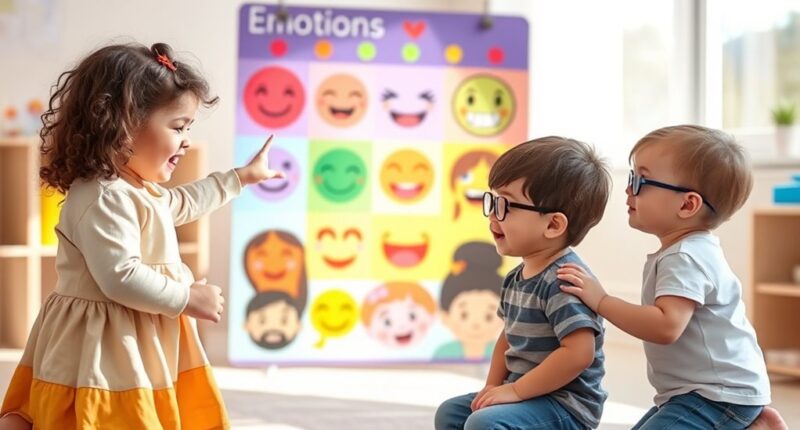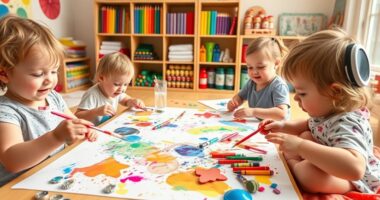Teaching toddlers about emotions is vital for their emotional intelligence. Start by helping them recognize and label their feelings using emotion charts and engaging stories. Playtime is a great opportunity for them to express and explore different emotions through imaginative play. You can enhance their emotional skills with activities like Emotion Charades or creating a calming corner. Supporting them in understanding their emotions builds empathy and resilience, which lays the groundwork for stronger relationships. Discover more effective strategies along the way!
Key Takeaways
- Use emotion charts and storytelling to help toddlers identify and label their feelings effectively.
- Engage in imaginative play to allow toddlers to experiment with different emotions and social roles.
- Incorporate activities like Emotion Charades and feelings-themed songs to enhance emotional expression and recognition.
- Establish a calming corner where toddlers can practice self-regulation techniques when feeling overwhelmed.
- Model adaptive emotional expression and validate your toddler’s feelings to support their emotional growth.
Understanding Emotional Awareness in Toddlers

Understanding emotional awareness in toddlers is essential because it lays the foundation for their future interactions and relationships. Toddlers experience intense emotions but often can’t express them verbally, making your support vital. By responding positively to their feelings, you encourage emotional expression and help them learn to regulate their emotions. This regulation is linked to empathy, fostering deeper connections as they grow. Additionally, as toddlers develop language skills, they gain a better understanding of their emotions and those of others. Your guidance in recognizing emotions not only promotes emotional awareness but also enhances their social-emotional development. Development influenced by biological factors plays a crucial role in this process. Incorporating emotional intelligence practices into daily routines can significantly support their growth. Furthermore, engaging in activities that promote emotional awareness can also support pet therapy initiatives that enhance social interaction. Research indicates that supporting children through divorce can also provide valuable lessons in emotional resilience. Ultimately, nurturing this awareness now sets the stage for their emotional intelligence and future success in managing relationships. Additionally, understanding the importance of advance directives can help parents make informed decisions regarding their child’s emotional well-being in various situations.
The Role of Play in Emotional Development
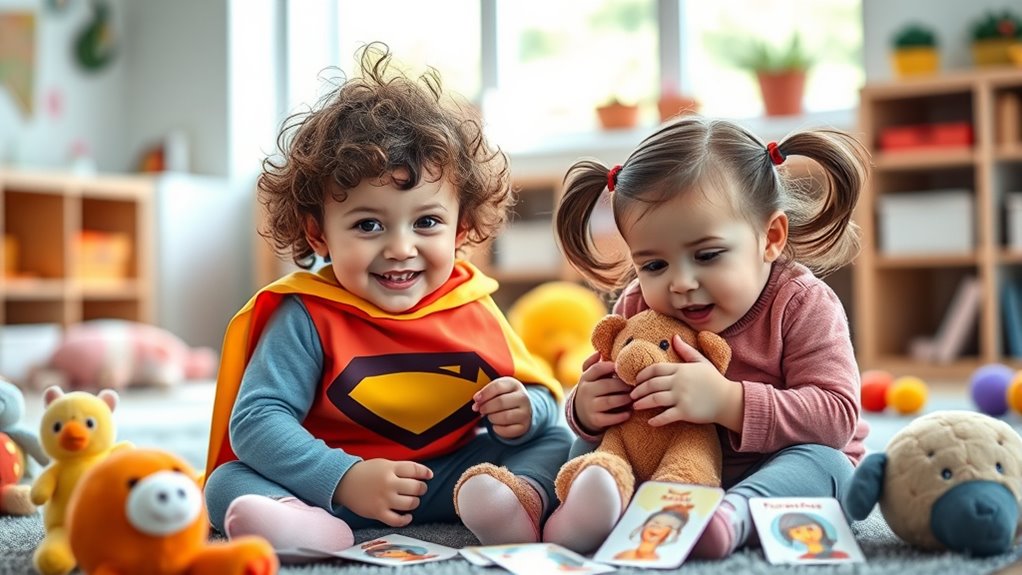
Play serves as an essential avenue for toddlers to explore and express their emotions, creating a safe space for healthy emotional development. Through activities like peek-a-boo and sensory play, your child builds trust and learns to regulate their emotions. Additionally, newborns benefit from imaginative play, which allows them to experiment with different feelings and roles, promoting empathy and emotional understanding. During play, toddlers communicate big emotions like frustration and anger without the constraints of real life, providing a constructive outlet. Additionally, engaging in hands-on learning experiences can further enhance their emotional intelligence as they navigate challenges through play. Toys that focus on sensory stimulation can significantly contribute to emotional regulation and awareness, while educational toys can also support emotional growth by fostering problem-solving and social interaction among peers. Moreover, introducing freshly squeezed juices in their diet can promote healthy habits and help them understand the importance of nutrition, supporting overall well-being.
Building Blocks of Emotional Intelligence
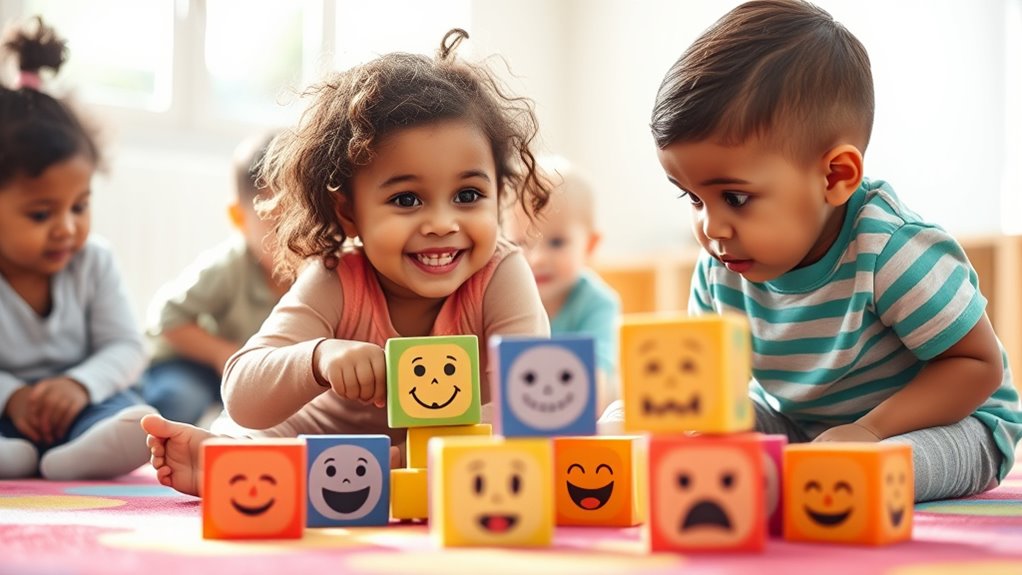
Emotional intelligence is an essential foundation for your toddler’s development, shaping how they navigate their feelings and interact with others. The core components include self-awareness, allowing your child to recognize their emotions, and self-management, helping them regulate those feelings. Incorporating healthy coping strategies can further support their emotional regulation. Additionally, teaching them to recognize signs of burnout can help them develop resilience when faced with overwhelming emotions. Social awareness fosters empathy, enabling them to understand others’ emotions, while relationship skills help them build strong connections. Responsible decision-making teaches them to make choices based on emotional insight. Practicing effective relaxation techniques can also provide your toddler with tools to calm themselves during emotional distress. Furthermore, encouraging your child to engage in healthy lifestyle practices can contribute positively to their emotional health.
To develop these skills, focus on emotion recognition and expression, encourage empathy, and promote effective conflict resolution. Modeling healthy emotional responses and using emotional labeling can reinforce learning. Additionally, cultivating an abundance mindset can enhance their overall emotional well-being and resilience.
Activities to Enhance Emotional Skills

As you engage your toddler in various activities, you’ll find that enhancing their emotional skills becomes both fun and effective. Try playing Emotion Charades, where you and your child act out different feelings, helping them recognize and express emotions. Create a Feelings Faces Collage to spark discussions about emotions. Singing emotion-themed songs can also aid in identifying feelings. Engaging in imaginative play with Waldorf toys can further enhance your child’s emotional exploration, fostering a sense of community connection that is vital for emotional development.
Incorporate storytelling with books that explore characters’ emotions to foster empathy, as capturing emotions in poetry can also be a powerful tool for understanding feelings. Additionally, sharing curated messages & wishes can help your child understand different ways to express love and kindness. Puppet shows and imaginative play encourage emotional exploration, while empathy discussions help your toddler understand others’ feelings. Use emotion flashcards for easy recognition and labeling. Finally, establish a calming corner for your child to practice self-regulation techniques like deep breathing, promoting emotional awareness and management.
The Impact of Parental Emotion Socialization

Understanding the impact of parental emotion socialization is essential for nurturing your toddler’s emotional development. Your reactions to their emotions greatly shape their emotional and social competence. When you validate their feelings, you support their ability to manage emotions effectively. Conversely, minimizing their emotions can hinder this growth. Furthermore, children of unfaithful parents may experience emotional distress that can affect their own emotional regulation and ability to form healthy relationships. It’s also important to express emotions adaptively; your emotional expressiveness serves as a model for your child. Engaging in discussions about feelings helps them label and understand their emotions better, promoting emotional intelligence. Additionally, research indicates that emotional dysregulation can significantly affect a child’s ability to form healthy relationships later in life.
Teaching Methods for Emotional Regulation
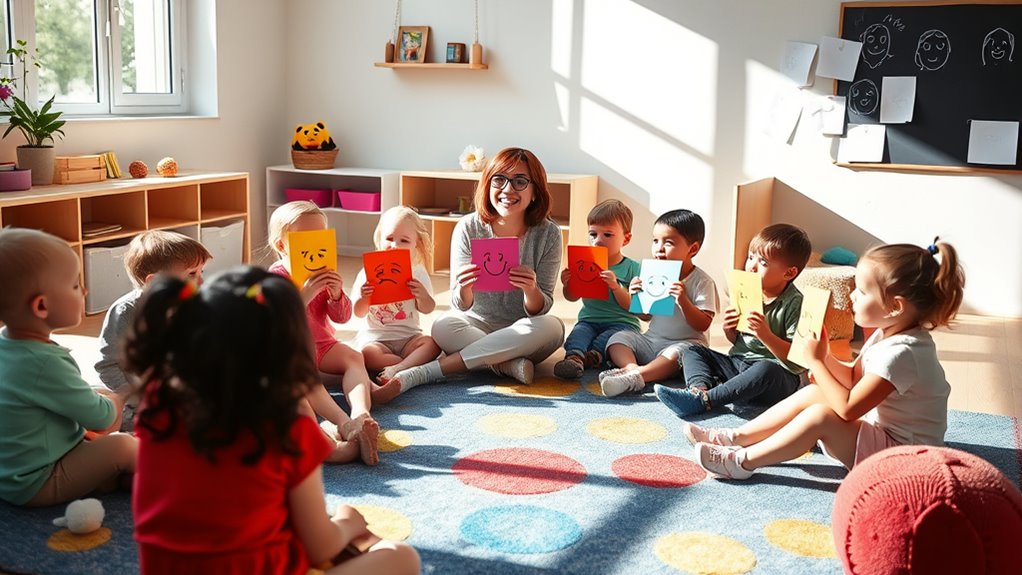
While toddlers often struggle to express and manage their emotions, effective teaching methods can make a significant difference in their emotional regulation.
Start by practicing active listening; make eye contact and show patience to encourage your child to share their feelings. Use visual aids like emotion charts to help them label and recognize emotions, and share stories that illustrate different emotional states.
Model calm behaviors in tense situations, as children learn by observing you. Engage them in activities like deep breathing exercises or blowing bubbles to help manage their emotions.
Finally, teach them strategies like seeking support or taking a break, empowering them to cope with their feelings in healthy ways.
Frequently Asked Questions
How Can I Tell if My Toddler Is Emotionally Intelligent?
You can tell if your toddler is emotionally intelligent by observing their ability to recognize and respond to emotions in themselves and others.
If they comfort a crying friend or express feelings like happiness or sadness, that’s a good sign.
Notice their curiosity about emotions and how they communicate their own feelings through words or actions.
If they seem aware of others’ feelings, they’re likely developing a strong emotional intelligence foundation.
At What Age Do Toddlers Start Recognizing Emotions?
Have you ever wondered when your toddler starts recognizing emotions?
Typically, toddlers begin to understand basic emotions like happiness and sadness around 12 months. By this age, they associate these feelings with familiar situations, such as smiling faces or frowning ones.
As they grow, their emotional awareness expands, enabling them to identify more complex emotions. This early recognition lays the foundation for their emotional development and social interactions in the years to come.
Can Emotional Intelligence Prevent Behavioral Issues in Toddlers?
Yes, emotional intelligence can prevent behavioral issues in toddlers. When you help them identify and express their feelings, they’re less likely to act out.
By teaching them to manage their emotions, you’re giving them tools to cope with frustration and conflict. This understanding fosters empathy and cooperation, making it easier for them to navigate social situations.
How Do Cultural Differences Affect Emotional Expression in Toddlers?
Did you know that by 11 months, infants can already distinguish between different cultural expressions of emotions? This fascinating ability highlights how cultural differences affect emotional expression in toddlers.
In Western cultures, children often show negative emotions actively, while Eastern cultures may encourage a more passive display. These cultural norms shape how toddlers express feelings, as they learn emotional regulation from their caregivers and adapt their responses based on their cultural environment.
What Signs Indicate My Toddler Needs More Emotional Support?
If you notice your toddler showing signs like irritability, mood swings, or increased clinginess, they might need more emotional support.
Watch for withdrawal from activities or frequent tantrums, as these can indicate distress. Excessive crying over minor issues or unexplained fears are also red flags.
If they revert to old behaviors, it’s a sign they’re overwhelmed. Pay attention to these cues, and don’t hesitate to provide the extra love and reassurance they need.
Conclusion
Just like a garden needs sunlight and water to thrive, your toddler’s emotional intelligence flourishes with your guidance. By nurturing their understanding of feelings and providing playful experiences, you’re planting seeds of empathy and resilience. As you cultivate these emotional skills together, you’re not just helping them grow; you’re creating a vibrant landscape where they can navigate life’s ups and downs. So, keep tending to that garden, and watch your little one bloom into a compassionate individual.
